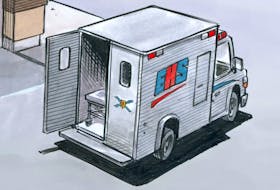NEW MINAS, N.S. — My long journey with PTSD, depression and anxiety has been so mentally crippling that I have had little choice but to leave my place of work and seek treatment. Although the road to mental wellness has been a painful one, the helper in me must reach out and help other mental illness sufferers.
One of the ways I decided to help was by talking openly about my own battle. I do so through Facebook and my blog. The result was amazing! So many people who were afraid to tell their story contacted me and asked if I would sit down with them. Thrilled at the opportunity, I met and chatted with way more suffers than I ever imagined I would.
Each individual had their own story to tell, but there were some common themes that I noticed within many of the different conversations; stigma was a huge issue for many but the one that was its closest rival was the wait time to get the help they needed. I was saddened by the frequency in which the long wait times kept coming up; so much so in fact, that many - most actually - had given up and turned their back on a system that had only prolonged their suffering.
With so many forced to deal on their own, myself included, I kept asking myself ‘What can be done to fill in the gap while people wait?’ One thing I thought of was creating a public health counsellor program, one who would go in the field and provided frontline care. Like the VON in the way that they make house calls in an attempt to deal with the overflow of physical medical needs. One benefit to this would be that a professional assessment could be made to determine the severity of one’s mental health condition and, based on that assessment, appropriate, short-term supports can be put in place while they wait for longer-term mental health care. Suicide intervention is a great example of a scenario that would require immediate attention.
The way I see it, mental health injuries, like that of physical health injuries are very similar in the way that they range in severity and, thus, should not be ignored. Dire mental health conditions shouldn’t go untreated and like many critical medical issues, early intervention can save lives. We are all impacted in some way by the pain of mental illness. Maybe it’s a family member or a friend who suffers. Either way, they deserve to have access to a mental health professional in a timely manner. It’s incumbent on us to demand better. Lives are depending on us advocating together.
Trained as an addictions counsellor, John Arenburg spent 15 years in the volunteer fire service and nearly 20 years working in a long-term care setting. Off work because of his mental heatlh injury, PTSD, he dedicates time to his blog, The Road To Mental Wellness - https://www.theroadtomentalwellness.com. John lives in New Minas with his partner and two children. If you wish to comment on this article, please write a Letter to the Editor or email [email protected].
RELATED:









